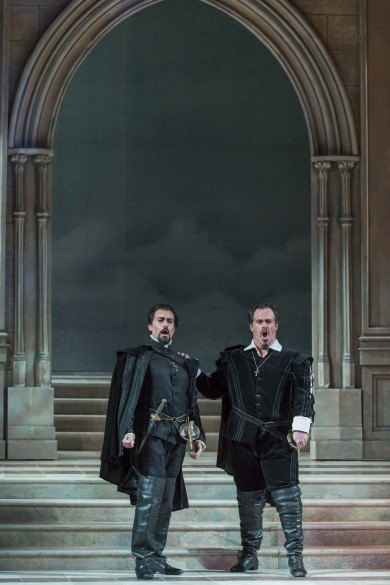Fine singing and superb conducting in Verdi’s “Don Carlos’ at Sarasota Opera
When an opera company opens a production of Don Carlos with the Woodcutters’ Chorus, you know they mean business.
Aida will be the glossy culmination of Sarasota Opera’s Verdi cycle next year. But for many aficionados it is this season’s staging of Don Carlos that has been one of the most-awaited events of the long-running series.
Sunday’s matinee performance wasn’t ideal, with rather rudimentary acting by many of the principals and stiff stage direction that didn’t equal the largely impressive vocalism.
Sarasota Opera isn’t giving us quite the Full Giuseppe, with the original version’s ballet falling victim to a straitened budget. Still, this is otherwise a Don Carlos complete in its original five-act French version with the Fontainebleu scene, including that compelling opening ensemble. Cut by Verdi before the 1867 premiere, the Woodcutter’s Chorus leads off the work with a strikingly different flavor, evoking Boris Godunov in the lamenting of winter privation and endless war by the people.
With six main characters, romantic intrigue, royal family betrayals, and enough political and religious conflict to fill two HBO miniseries, the French Don Carlos has plenty of vocal opportunities for each of the principals.
Two artists were repeating their roles from the company’s performances of the revised Italian version (Don Carlo) in 2009. As Rodrigue, Don Carlos’s close friend and crypto-political ally, Marco Nistico was even more outstanding than six years ago, blending dramatic credibility and superb vocalism in the most convincing fashion. The Italian baritone’s voice has grown in weight and power, and Nistico served up a commanding “C’est mon jour suprême” and rousing account of the oath duet, “Dieu, tu semas dans nos âmes,” with Carlos.
Jonathan Burton cut a rather awkward, unheroic figure in the title role with inconsistent acting. (His mild reaction to the disguised Eboli revealing herself evoked audience chuckles.) Vocally, however, the tenor delivered the goods with a strong and vibrant voice and his singing was reliably impressive throughout the long afternoon.
As Elisabeth de Valois, Michelle Johnson made a solid company debut. The young soprano clearly needs some seasoning with acting limited to basic gestures, though she displayed an attractive if rather unvaried soprano and offered a worthy “Toi qui sus le néant.”
Along with Nistico’s Rodrigue, Mary Phillips’ Eboli provided the most satisfying portrayal. Dramatically viable and showing an ample dramatic mezzo, her “O don fatal” was a highlight of the performance.
Repeating his 2009 turn as Philip II, Kevin Short was a vocally imposing monarch, conveying the conflicted king’s vulnerability in an affecting “Elle ne m’aime pas.”
Bass Young Bok Kim was a sonorous Grand Inquisitor, Tyler Putnam a worthy Monk. Riley Svatos was a fine Thibault, and, singing from the balcony, Jennifer Townshend provided an aptly radiant Celestial Voice.
The traditional, rather monochrome 2009 production by David P. Gordon with its unit set framed by rising stairs and columns, was modified slightly for each of the scenes. Howard Tsvi Kaplan’s costumes were rich and resplendent.
Stephanie Sundine’s workmanlike direction intermittently fell into stock-stagey gestures; the ending with the apparition of Charles V (here “a Monk”) who covers Carlos in his mantle fell particularly flat on Sunday.
Victor DeRenzi, however, demonstrated his Verdian mastery once again in every bar. Sarasota Opera’s artistic director consistently made manifest the remarkable originality and variety of this score, supported the singers alertly in the individual arias, and putting across the music’s power in ensemble scenes. With superb playing from the orchestra, DeRenzi brought stirring pomp and majesty to the auto-da-fe scene, and the extended prelude for horns that opens Act 2 sounded almost Wagnerian. The robust choral singing under the direction of Roger L. Bingaman was on the same high level.
Don Carlos will be repeated March 18, 21 and 24. sarasotaopera.org
Posted in Performances
Leave a Comment
Wed Mar 18, 2015
at 2:19 pm
No Comments







